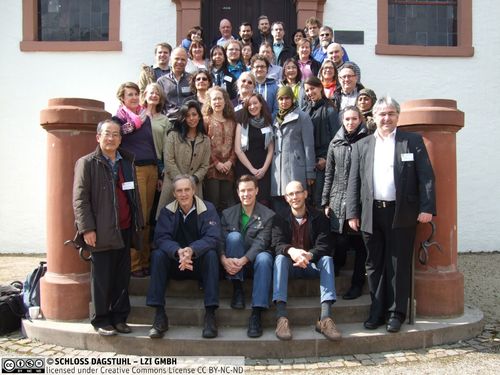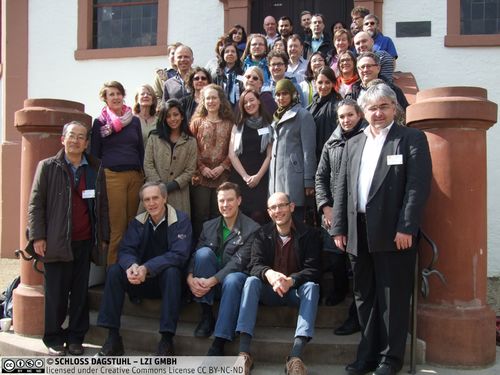Dagstuhl Seminar 14131
Computational Models of Cultural Behavior for Human-Agent Interaction
( Mar 23 – Mar 28, 2014 )
Permalink
Organizers
- Elisabeth André (Universität Augsburg, DE)
- Ruth Aylett (Heriot-Watt University Edinburgh, GB)
- Gert Jan Hofstede (Wageningen University, NL)
- Ana Paiva (INESC-ID - Porto Salvo, PT)
Contact
- Christina Schwarz (for administrative matters)
Schedule
In the last twenty years, significant advances have been made in enhancing the believability of virtual agents by endowing them not only with multimodal conversational behaviors, but also tailoring their behavior to emotional and/or personality. However, few researchers have taken up the challenge of modeling the influences culture has on behavior so far even though there is clear empirical evidence that the culture a virtual agent reflects strongly influences how it is accepted by a human user. The design of agents that reflect a particular cultural background requires computational models that allow the explicit representation of cultural parameters impacting the behavior of the agents in the same way as theories of cognitive appraisal and coping behavior underlie emotional parameters in affective agent architectures. However, research into agent architectures that include cultural factors in the virtual agents’ internal knowledge and reasoning is still quite new. Basically, there are two approaches to implement computational models of cultural behavior in the Autonomous Agent and Multi-Agent community:
- Data-driven approaches to computational models of cultural behavior
In the data-driven approach, computational models of cultural behaviour are based on annotated multimodal recordings of existing cultures from which culture-specific behavior profiles are learnt. The advantage of data-driven computational models of cultural behavior lies in their empirical foundation. However, the collection and annotation of cross-cultural corpora is extremely time-consuming and usually requires a multi-national effort. Furthermore, the data is hard to generalize to other settings, for lack of a causal model. It is also not obvious how to map statistical behavior data onto computational models even though first attempts have been made in the area of intelligent virtual agents using machine learning approaches.
- Computational models of cultural behavior as extension of agent mind architectures
Another approach to implement computational models of cultural behavior is to start from existing multi-agent architectures and extend them to allow for culture-specific adaption of goals, beliefs and plans. While a more formal approach to cultural models is very well suited for the implementation of synthetic cultures and usually ensures a higher level of consistency than the data-driven approach, it is not grounded in real data and thus may not completely realistically simulate existing cultures. Another limitation is that it is difficult to decide which specific gestures and behaviors to choose for externalizing the goals and needs generated in the agent minds. Based on the observations above, a promising approach to advance the state of the art in this area seems to be an integration of research on agent mind architectures with research on data-driven approaches to modeling agent behaviors. Strongly motivated by the interest from academic, industrial and educational organizations in virtual agents as part of social simulations, language and culture training tools, we decided to organize a Dagstuhl seminar on computational models of cultural behavior for human-agent interaction. We believe that the time is ripe to gather experts with a background in intelligent virtual agents, human-computer interaction and cultural theories to discuss their insights and approaches to this topic. In an increasingly globalized world, cultural sensitivity, awareness and understanding has become a major factor of success. As more and more companies do business in other cultures, there is large demand for ICT-based language and culture training systems.
The seminar was the first international meeting on computational models of culture. The gathering of a multi-disciplinary team of experts with a background in intelligent virtual agents, human-computer interaction and cultural theories provided us with a lot of inspirations for future research projects. We did not only identify relevant topics for a roadmap on computational models of culture, but also worked out a number of intriguing applications for cultural agents.
In order to exploit the momentum and enthusiasm generated by the seminar, we discussed some ideas for community building. We plan to organize a follow-up Dagstuhl seminar in about two or three years. However, some participants felt they would not like to wait for such a long time and spontaneously decided to have an additional workshop on Cultural Models for Intelligent Virtual Agents at the Fourteenth International Conference on Intelligent Virtual Agents (IVA 2014) in Boston this year. Furthermore, we discussed the edition of a book and/or a special issue. In addition, we talked about possibilities to share and distribute corpora to support comparative studies of culture-specific behaviors.
 Elisabeth André, Ruth Aylett, Gert Jan Hofstede, and Ana Paiva
Elisabeth André, Ruth Aylett, Gert Jan Hofstede, and Ana Paiva
- Jan M. Allbeck (George Mason University - Fairfax, US) [dblp]
- Jens Allwood (University of Göteborg, SE) [dblp]
- Elisabeth André (Universität Augsburg, DE) [dblp]
- Ruth Aylett (Heriot-Watt University Edinburgh, GB) [dblp]
- Nadia Bianchi-Berthouze (University College London, GB) [dblp]
- Timothy Bickmore (Northeastern University - Boston, US) [dblp]
- Emmanuel G. Blanchard (IDÛ Interactive Inc. - Montréal, CA) [dblp]
- Justine Cassell (Carnegie Mellon University, US) [dblp]
- Nick Degens (Wageningen University, NL) [dblp]
- Colette Faucher (Aix-Marseille University, FR) [dblp]
- Samantha Finkelstein (Carnegie Mellon University, US) [dblp]
- Kobi Gal (Ben Gurion University - Beer Sheva, IL) [dblp]
- Lynne Hall (University of Sunderland, GB) [dblp]
- Béatrice Hasler (University of Barcelona, ES) [dblp]
- Rüdiger Heimgärtner (IUIC - Undorf, DE) [dblp]
- Dirk Heylen (University of Twente, NL) [dblp]
- Gert Jan Hofstede (Wageningen University, NL) [dblp]
- W. Lewis Johnson (Alelo Inc. - Los Angeles, US) [dblp]
- Kristiina Jokinen (University of Helsinki, FI) [dblp]
- Catholijn M. Jonker (TU Delft, NL) [dblp]
- Rilla Khaled (University of Malta, MT) [dblp]
- Felix Kistler (Universität Augsburg, DE) [dblp]
- Tomoko Koda (Osaka Institue of Technology, JP) [dblp]
- Sarit Kraus (Bar-Ilan University - Ramat Gan, IL) [dblp]
- Brigitte Krenn (OFAI - Wien, AT) [dblp]
- H. Chad Lane (USC - Playa Vista, US) [dblp]
- Lydia Lau (University of Leeds, GB) [dblp]
- Birgit Lugrin (Universität Augsburg, DE) [dblp]
- Jean-Claude Martin (LIMSI - Orsay, FR) [dblp]
- Bilyana Martinovski (University of Stockholm, SE) [dblp]
- Samuel Mascarenhas (IST - Lisbon, PT) [dblp]
- Phaedra Mohammed (The University of the West Indies - St. Augustine, TT) [dblp]
- Yukiko I. Nakano (Seikei University, JP) [dblp]
- Toyoaki Nishida (Kyoto University, JP) [dblp]
- Hirotaka Osawa (University of Tsukuba, JP) [dblp]
- Ana Paiva (INESC-ID - Porto Salvo, PT) [dblp]
- Catherine Pelachaud (Telecom ParisTech, FR) [dblp]
- Matthias Rauterberg (TU Eindhoven, NL) [dblp]
- Matthias Rehm (Aalborg University, DK) [dblp]
- Kasper Rodil (Aalborg University, DK) [dblp]
- Suleman Shahid (Tilburg University, NL) [dblp]
- David R. Traum (USC - Playa Vista, US) [dblp]
Classification
- artificial intelligence / robotics
- society / human-computer interaction
Keywords
- Intelligent virtual agents
- behavior models
- agent architectures
- social behavior simulation
- multimodal corpora
- culture



 Creative Commons BY 3.0 Unported license
Creative Commons BY 3.0 Unported license
